#Wives and Daughters
Text
I make fun of all the horrible parents in Austen, but they've got nothing on the fathers in Gaskell's works.
Austen fathers will do things like:
Sit in his library and make fun of you and your sisters instead of preparing for your futures
Be a health nut hypochondriac who prefers that he and everyone else stay safely at his home
Be a vain fop who wastes all his money
While Gaskell fathers do things like:
Murder a guy
Lose other people's money through speculation and then commit suicide
Doom himself to a lifetime of marriage with an unsuitable woman because boys were starting to be interested in you
Make you, a teenager, tell your mother that you're all going to move across the country on very little notice because he never bothered to mention the crisis of conscience he'd been wrestling with for years
Incite a mob to riot and burn down the home and business of a local family
Gaskell fathers are just living on an entirely different level of drama.
But the worst part is that the Gaskell fathers also tend to be much more loving than Austen's.
#jane austen#elizabeth gaskell#pride and prejudice#emma#persuasion#north and south#wives and daughters#mary barton#sylvia's lovers
239 notes
·
View notes
Text
We need to talk about the Compromise Trope
Tl;DR It makes zero flipping sense because men always face a smaller social cost than women. You cannot force a powerful man to do anything, much less get married for life to someone he hates. And you wouldn’t actually want this trope to be true, because even if a man is forced to marry, he can just abandon or mistreat his wife. (This is a really long post)
Discussion of sexual assault and spousal abuse.
For those who don’t know, this is an extremely common trope in Jane Austen Fan Fiction/Regency romance. I don’t know where it originated, though there are two types of situations in Jane Austen’s works which are close. The basic premise is this: a man and woman are caught alone in a dark room/kissing (with full consent on both sides or not)/just hugging sometimes and a whole bunch of people scream and they are forced to get married.
Often both sides are unhappy with this marriage but it must happen, so they deal with it. This is the most common form of “Forced Marriage Situation” in the JAFF that I have read and heard about.
The two situations that come close are Lydia and Wickham’s elopement and then behaviour that has engaged honour in Pride & Prejudice, Sense & Sensibility, Mansfield Park, and Persuasion. With Lydia and Wickham, that wasn’t an innocent kiss in a library, they were living together and most likely having sex for a few days/weeks before Darcy got the whole situation figured out. However, Darcy did not try to force a marriage first, he actually tries to get Lydia away. What we can assume from this is that Darcy recognizes that marriage to a dishonorable man is worse than the blow to Lydia’s (and her family’s) reputation or life’s happiness.
Situations where honour is engaged but no actual touching has happened (as far as we know), are Jane/Bingley, Marianne/Willoughby, and Louisa/Wentworth. In each of these situations, a man and a woman act in such a way that people begin to assume that they are engaged. Word is spread abroad, and the men all absent themselves from the situation in the hopes that rumours will die down. Lastly we have Henry Crawford/Maria Bertram, who do touch in the context of a play and who are acting very flirtatiously even though Maria is engaged. Henry also pointedly quits the scene. Two of these men (or their friends) are trying to exit an engagement situation fairly, two of them are just ghosting because they don’t care.
But here is the problem with the trope: while a man may be honour-bound to propose if he’s been raising expectations, no one can force him. Mrs. Bennet and Mrs. Jennings both complain to the world that Jane and Marianne have been ill-used, but nothing comes of it! Bingley comes back eventually, but not because he’s “compromised” Jane and feels bad about it. Willoughby gets married to Miss Grey anyways and he doesn’t suffer that much socially (Sir John forgives him before the novel ends). Also, Willoughby seduced and impregnated Eliza Williams, which is way past “compromise”, and while it’s not clear how widely known this is, he is not shunned socially for that indiscretion either.
This is the whole problem with the trope: powerful men can survive far greater social disgrace than women!!! This is probably partially because women are expected to be virgins and men are not, but also because of the imbalance in marriage prospects. I imagine that a woman with £30,000 pounds could weather a scandal far better than someone like Eliza Williams. Men like Henry Crawford and Darcy would be basically bulletproof, or at least that is how they are portrayed.
Oscar Wilde spends a lot of time on this imbalance of consequences (especially in A Woman of No Importance) and his conclusion is that men can basically get away with anything while women, and sometimes their children, bear the full brunt of social cost. We still see this today! It’s the woman who most often bears the consequences for getting pregnant as a teen, for example, and the largest blow to their future prospects.
In the only “compromise” I’ve read in a contemporary novel, Molly in Wives & Daughters (written in 1866) is caught giving Mr. Preston a letter and meeting with him clandestinely. What happens is nothing like the JAFF compromise trope. Molly’s reputation is trashed, but Mr. Preston is certainly not forced to marry her, people just talk about how they will probably marry. Molly is the one who bears almost the entire social cost, Mr. Preston isn’t even that worried about it until his employer gets involved. He is only a steward and could be held accountable by a higher up, people like Darcy and Crawford have no one who could do the same thing.
Another thing I see now which is just wild is Caroline trying to sneak in Darcy’s room at night. I don’t know how that is supposed to make a “compromise” since there are no witnesses, but also, that is incredibly dumb. A man as powerful as Darcy could have full on sex with a woman and deny it and probably face almost no backlash. Especially since Caroline would have no proof. I mean she can’t get a DNA test in this era and once she admits she’s had sex it could have been with a footman.
And you say, but Darcy is honourable? Sure, but this woman threw herself at him without consent! I am sure he wouldn’t have sex with Caroline without marrying her, but if she started kissing him and then people demanded they marry? It would be perfectly moral for him to throw her under the bus. And then Caroline’s reputation is destroyed and she gains nothing.
The fact is, if “compromise” was a real thing, it would be gamed. Humans will take any loophole and widen it until you can drive a truck through it. All of the nobility would be married by women throwing themselves at them, here, I wrote a farce about it.
If anything, the “compromise” trope is a fantasy where men are actually held accountable for violating women. Which seems like it would be nice, but considering that some women, especially Caroline, weaponize “compromise”, you start to border on some disturbing territory. Like the idea that women who accuse famous people of rape are just doing it for attention/wealth. And that is not great! That is something we also still struggle with today.
The only way “compromise” works as it is presented is if someone more powerful than the man involved forces him to marry. So for example, a father threatens to cut off his son’s allowance or disinherit him, like Mrs. Smith in Sense & Sensibility. However, even married a man isn’t “trapped”, he can just leave his wife behind and fuck off to Italy. Which is literally the plot of All's Well That Ends Well by William Shakespeare, in which the king forces a man to marry. This happens in Jane Austen too! Wickham just goes to London and Bath to enjoy himself and leaves Lydia with her family. Or if you’d like real world examples: Percy Shelley and Lord Byron. Also Jane Eyre now that I think about it...
But that’s not even the worst that could happen! In Mrs. Hubback’s The Younger Sister, (a completion of the novel fragment The Watsons by Jane Austen) which was written in 1850, we have this chilling exchange about a man forced to marry:
"Ah, I am glad I have brought you to your senses, at last; now consider, if we could do as Emma advises, and persuade this Mr. Musgrove to marry, as he ought, there would be an end of all trouble in the affair."
"To you, perhaps, but not to Miss Margaret; I dare say her amiable husband would beat her every day."
This situation was a bit different, they were suing for breach of contract because Mr. Musgrove proposed to Margaret and then pretended he hadn’t. Two women overheard the proposal and would have been able to testify in court against Mr. Musgrove. This was a real thing and could either result in restitution payments or marriage. However, you couldn’t sue for breach of contract over a kiss or a “compromise”, you needed proof of engagement. The real cases I have seen involved publicly known engagements, or letters and tokens of affection (think Lucy Steele in Sense & Sensibility) So again, not “compromise.”
The point though is that a man being forced to marry a woman could abuse her without much repercussion. In JAFF/Historical romance it always works out, but in real life I can see someone being pretty resentful that they were forced to get married and taking it out on the other party.
Also, the entire concept of a man trapped in an engagement and unable to get out because of their reputation/honour is kind of laughable because that’s why breach of contract laws exist! And women, who were technically “allowed” to back out, faced pressure to marry:
“But after a certain time—after the world suspects that two people are engaged to each other, it is scarcely possible for the woman to recede: when they come within a certain distance, they are pressed to unite, by the irresistible force of external circumstances. A woman is too often reduced to this dilemma: either she must marry a man she does not love, or she must be blamed by the world—either she must sacrifice a portion of her reputation, or the whole of her happiness.” (Belinda Ch 18, Maria Edgeworth)
So again, the social burden is carried by women
(Brief note about Edward Ferrars, he is trying to honour his promise to Lucy Steele and is “trapped” in an engagement, but he made that proposal of his own free will. His family would clearly have supported him in a breach of promise suit so he could marry Miss Morton. Lucy only has a hold on Edward because he’s too honourable to jilt her.)
Lastly, duels. I know almost nothing about duels but they just sound profoundly stupid to me. The only duel we see in Jane Austen is between Colonel Brandon and Willoughby, they are both unwounded and go home quietly. I don’t know what duels are supposed to solve, if Colonel Brandon had killed Willoughby he probably would have gone to jail/been hung (I don’t know if he’s rich enough to get away with it). So if he wins, Eliza is screwed, if he loses, Eliza is screwed, there is really no good outcome.
Mrs. Bennet wants Mr. Bennet to fight Wickham, but to what end? If Mr. Bennet killed Wickham, then Lydia isn’t un-ruined? So what is the point? I guess maybe the man agrees to marry your daughter rather than face death? It just seems like pointless drama to me. I don’t think I’ve ever heard of a duel with a good outcome, illuminate me in the comments/reblogs if you have.
Here is what I imagine is a more realistic scene of “compromise”: A man and woman are making out, some people burst into the library! Social pressure mounts for the couple to marry, but the guy isn’t interested. He goes to Italy for fun, leaving the girl to bear the full brunt of slut shaming and reputation damage.
Five years later, the man returns and is invited back into society. The girl is unmarried and unmarriageable, perhaps banished by her family to some cottage. Or she stuck it out and hoped people would forgive a youthful lapse of propriety, was she rich and pretty enough to get over the stigma? One can only hope.
Now specifically in Pride & Prejudice variations:
There are some cases where Darcy doesn’t like Elizabeth and is mad that he has to marry her. I just don’t think those would happen. After all, he encourages Bingley to leave Jane while there is still wiggle room, I think he’d just leave and hope for the best. He might even pay a breach of contract fine, after all, if he marries a woman he hates or distrusts, that’s the rest of his life and the reputation of Pemberley forever. Paying a fine and waiting for people to forget would hardly hurt him. And he probably wouldn’t think it was morally wrong if he suspected that Elizabeth did it on purpose to try and trap him.
There are other situations where Darcy is happy to marry Elizabeth but she hates him. These may also not result in marriage because Elizabeth is pretty big on not marrying people she does not love for social gain. I mean especially a man who just sexually assaulted her! If she thinks as poorly of him as she does canonically at Hunsford, I can’t see her saying yes. After all, now not only is Darcy someone she dislikes, he just proved he isn’t trustworthy or capable of self control.
Also, there are way too many variations where despite hating Darcy, Elizabeth is totally into the kiss. Which is so weird to me! If someone I hated kissed me they would be slapped! I doubt people are going to be screaming for Elizabeth to marry someone who assaulted her, they’d probably be angry at Darcy.
Lastly, Caroline Bingley. She is trying to compromise Darcy but sometimes ends up in a compromise marriage herself. Now she is actually rich and has a very caring brother. I cannot see her doing something like actually marrying Wickham or Mr. Collins. She could probably survive the reputation damage because of her large fortune or live on her dowry. After all, Darcy has told her Wickham can’t be trusted. It would be dangerous for her to agree to marry him.
Basically, I think any compromise situation in Pride & Prejudice is out of character. If one really wants Darcy and Elizabeth married pre-understanding and reformation arc, I would suggest placing Elizabeth in reduced financial circumstances, like Mr. Bennet dying. Otherwise, you need to significantly change the characters of both Elizabeth and Darcy.
#wives and daughters#elizabeth gaskell#The Younger Sister#mrs. hubback#oscar wilde#compromise trope#historical romance#jane austen fan fiction#JAFF#pride and prejudice variations#pride and prejudice#jane austen#long post#and kind of rambling#I hope I made my point#a woman of no importance
111 notes
·
View notes
Text
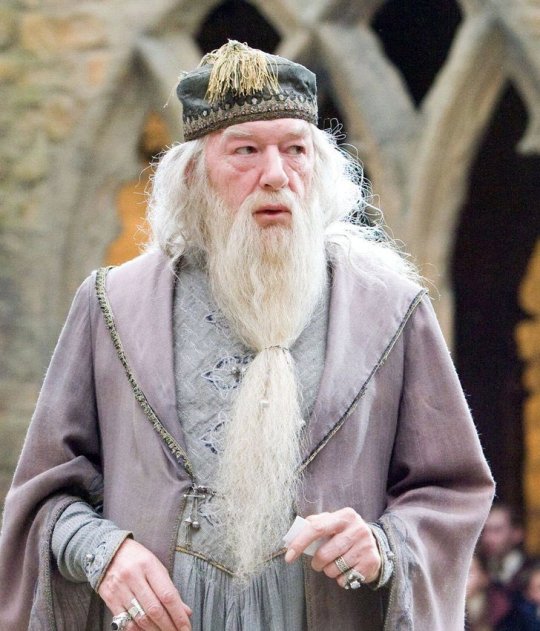
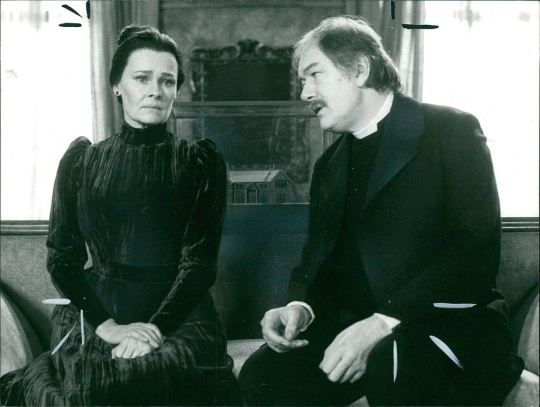

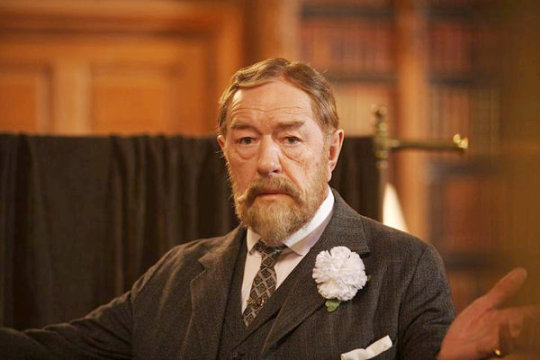
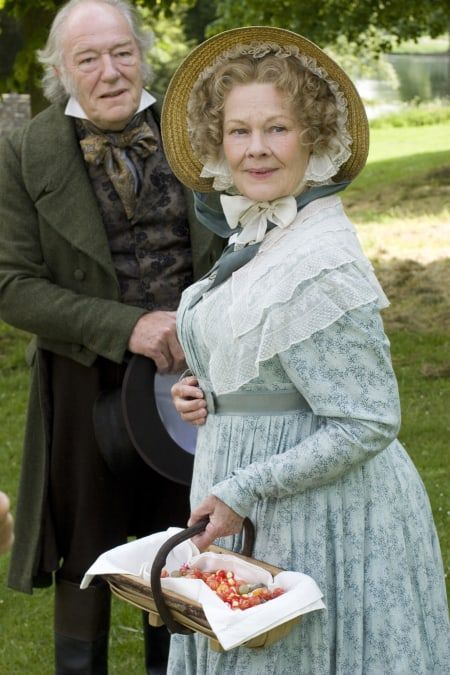
One of my favorite actors, Michael Gambon, best known as Dumbledore, Mr. Woodhouse in Emma and King George in The Kings Speech has died. Michael Gambon (19 October 1940 – 27 September 2023)
38 notes
·
View notes
Photo


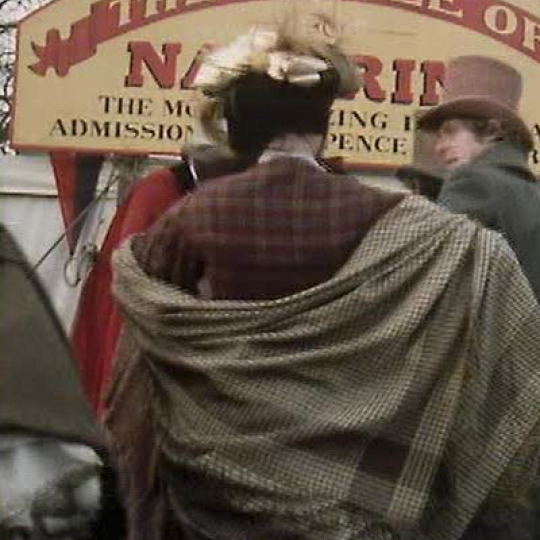

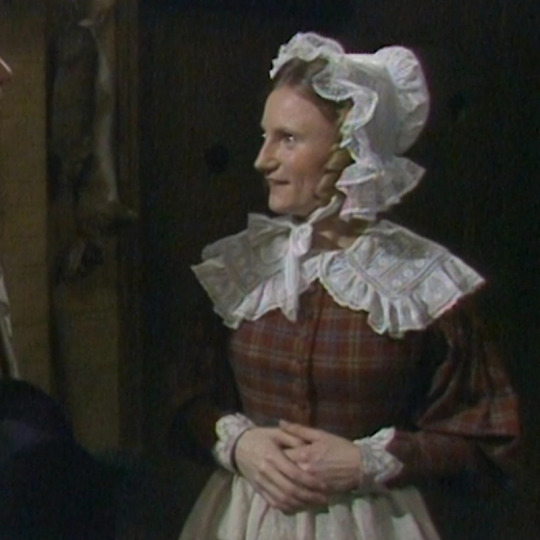

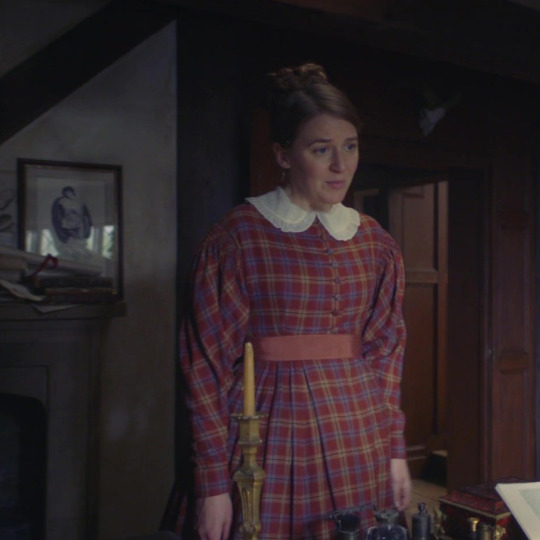
This dress has seen extensive use over the years. Its first sighting was on actress Sheila Raynor as Tabitha Aykroyd in the 1973 mini-series The Brontës of Haworth. In 1978 it was spotted on Pippa Guard as Maggie Tulliver in The Mill on the Floss. The following year it made a very brief appearance on an extra in The Old Curiosity Shop. 1985’s The Pickwick Papers recycled the dress for use on Tamsin Heatley in the role of Mary, and in 1999 Justine Waddell wore the costume as Molly Gibson in Wives and Daughters. In 2007, the gown was worn by Julia Sawalha as Jessie Brown in Cranford, and finally in 2019 on Gemma Whelan as Marian Lister in Gentleman Jack.
Costume Credit: Ameliadean, carsNcors Sarah A. Shrewsbury Lasses
E-mail Submissions: [email protected]
Follow: Website | Twitter | Facebook | Pinterest | Instagram
#gentleman jack#cranford#wives and daughters#the pickwick papers#the old curiosity shop#the mill on the floss#the brontes of haworth
283 notes
·
View notes
Photo
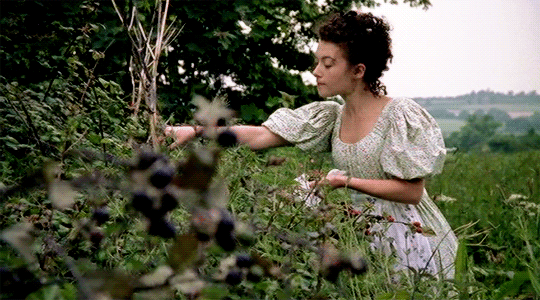
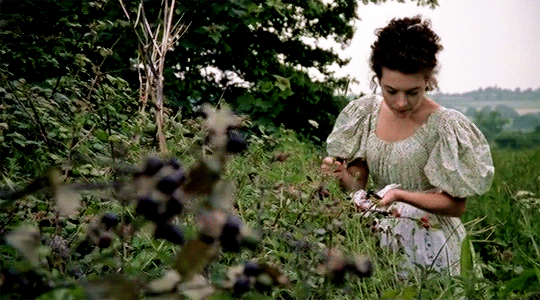
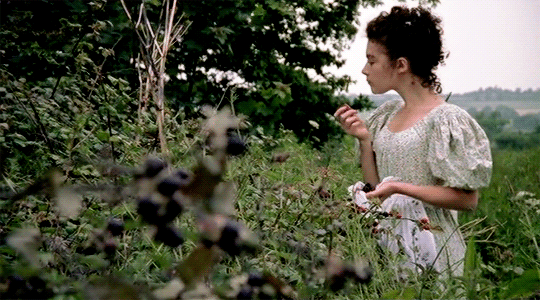
Wives and Daughters (1999)
#elizabeth gaskell#wives and daughter 1999#wives and daughters#molly gibson#justine waddell#perioddramaedit#period drama#our gifs#our creations
294 notes
·
View notes
Text
I am so intensely in love.
9 notes
·
View notes
Note
Austen Asks But For Gaskell: 6, 8, 24, 28
6. Favorite movie adaptation
There's fewer of these, so it's easier to pick :D definitely Wives and Daughters (1999). Best screenplay Andy wrote (that I have seen), pretty much Davies-ism free? Ending and a couple other bits aside, it's faithful? And I really like the cast, for the most part?. Some of it I'd even call inspired. Justine Wadell gives Molly that balance between her tendency to cry and her father's temperament and wit. One feels like Michael Gambon was born to play Squire Hamley's type. Bill Paterson is not as handsome as the character is supposed to be, but he does nail the rest. I do like Francesca Annis, though ever since I knew the 1983 radio drama had cast Angela Pleasance, she cannot be perfect XD It's a pity that Anthony Howell is so handsome, because he did well as Roger, and while I'm usually not impressed by Keeley Hawes, I think she did Cynthia well too. But I'm obsessed with Tom Hollander as Osborne. He sells it. He plays this extremely dramatic and romantic fated young man so so well. He honestly deserves more praise than he gets.
And there's of course the fabulous hair and lovely costumes too (blu ray release when BBC)
8. Least favorite couple
This is where I'd put a joke one like Lady Glenmire and the butcher from Cranford, but while I haven't finished Mary Barton, I do get the feeling I wouldn't feel deeply about that one in the end (considering Gaskell herself thought John Barton was the main tragic hero of her story, that kind of checks out).
24. Favorite supporting character
I think lord Cumnor from Wives and Daughters is underrated. He's a riot every single time he shows up, 10/10 would love to spend time with that man. There's side characters like Lady Harriet or Nicholas Higgins that have such depth and such flavor that it feels unfair not to pick them first, but... the heart wants what the heart wants I suppose XD
28. Favorite character backstory or secret
Mr Gibson's mysterious past is a sort of small running joke through Wives and Daughters, but "poor Jeanie" is such a master stroke? Mr Gibson is funny, and he loves Molly, and he grows to love Cynthia, which isn't an easy person to love. He's a good doctor too. But all the while there's a certain uncomfortable something running at the back of his personality. His jealousy of Molly is driven by the ghost of "poor Jeanie", who clearly was a victim of his passions to some degree or other (and the fact that it is never made clear what such degree is is a truly fascinating choice), and of whom we get the uncomfortable sensation that full reparations were not made to. His choice of wife in Mrs Kirkpatrick has an undercurrent of the same brand of moral failure, even if, of course, tempered by time, age, and circumstance. It's such a small thing in the scheme of the story, but it creates a distance between the reader and the character that resembles in a way the distance between him and Molly, as much as they love and understand each other.
From this ask game.
11 notes
·
View notes
Text
Louisa May Alcott 🤝 Elizabeth Gaskell:
Writing stout, homely-looking romantic leads with kind hearts, handsome teeth and effeminate "rivals".
16 notes
·
View notes
Text
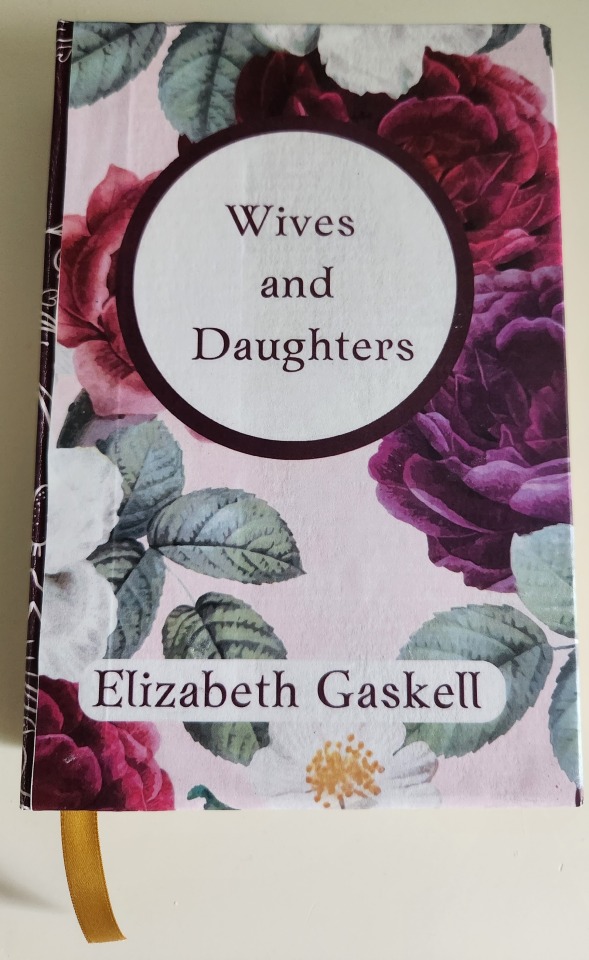
I found a copy of Wives and Daughters at a library book sale. Unfortunately, the cover was torn. Fortunately, this gave me an excuse to design and create my own cover. I found the image on a stock photo site (possibly Freepik) and used it for the front and back.
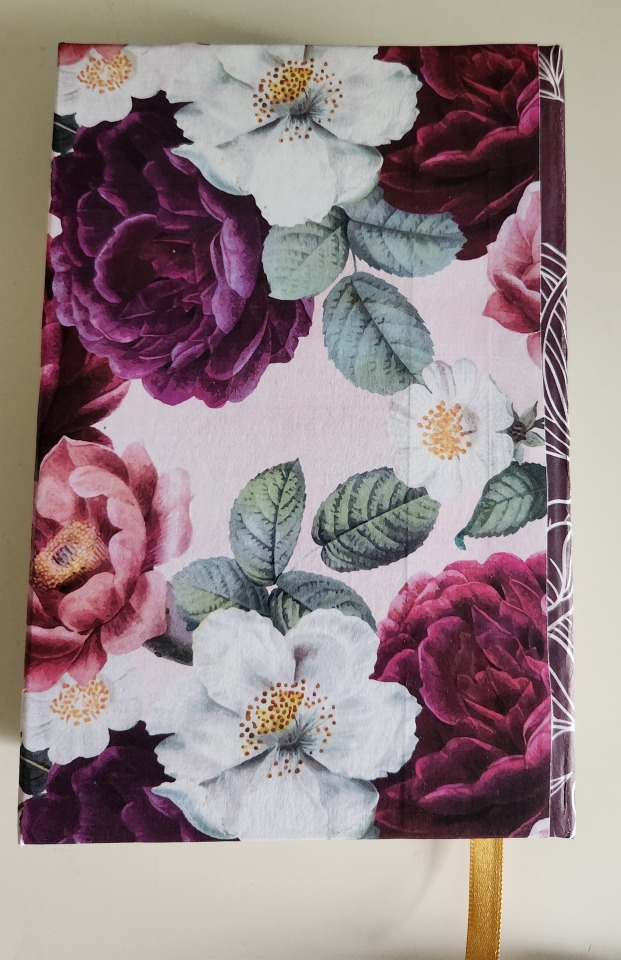
Then I designed the spine (using free Canva filigree).

After such a bold outside, I wanted a more subdued inside, so I just went with some stripes neutral scrapbook pages for endpapers (plus a gold ribbon bookmark, of course).
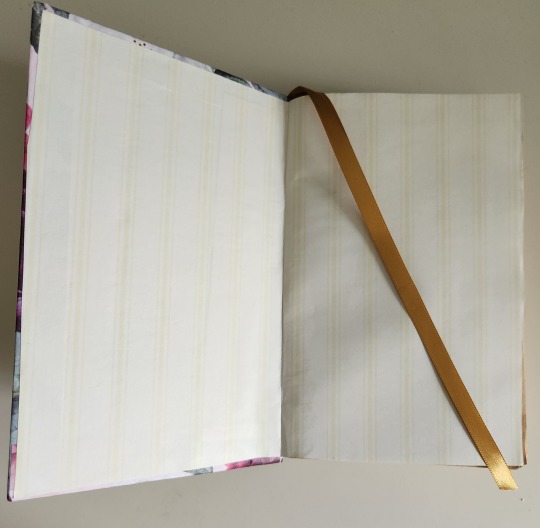
Overall, I'm pleased with the result, especially since it means I get to have my favorite novel (of the moment) on my shelf.
22 notes
·
View notes
Text
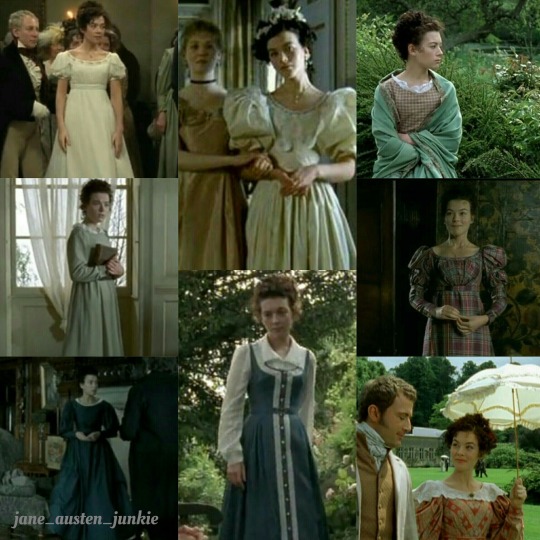
Justine Waddell as Molly Gibson in Elizabeth Gaskell's Wives and Daughters
21 notes
·
View notes
Text
Governess is not a “fall back” Job
There is this thing I encounter a lot online, where someone points out that as a member of the gentry, a woman can’t just get a job, and someone else says, “She could be a governess.” I don’t think she can.
We see some examples of governesses across Regency and Victorian novels. Jane Fairfax in Jane Austen’s Emma, Cynthia Kirkpatrick in Elizabeth Gaskell’s Wives & Daughters, Agnes Grey, in Agnes Grey by Anne Brontë, and of course, Jane Eyre in Jane Eyre by Charlotte Brontë.
All of these girls are highly educated, most of them with the purpose of becoming a governess at some point. All of them, to the best of my memory, can play music and draw. Most speak French; Jane Fairfax can sing in Italian. They are “highly accomplished”.
Now let’s take a peek at Jane Austen’s heroines. Emma Woodhouse and Anne Elliot would meet those standards (and I’m not sure Emma can speak a second language). They also happen to be the most stable of heroines (Emma doesn’t even need to marry, Anne can just live with Lady Russell or Mary). Elinor and Marianne Dashwood also would probably qualify, and they might actually need to if something went wrong.
But Elizabeth Bennet, Catherine Morland, and Fanny Price? They are not at all qualified to be governesses. Which in Fanny’s case is actually super poor planning, since they don’t seem to know what exactly will be her lot in the future. Elizabeth kind of plays piano, not well, but cannot draw and doesn’t have the formal education people would be looking for: her manners are not of the fashionable world. Catherine and Fanny both cannot draw or play, though I believe both can actually speak French.
If Fanny Price advertised herself for a governess, I think she’d fail. She’d certainly be beaten out by all the women actually trained for the job, like Jane Fairfax. She doesn’t have marketable skills! Which I think is the real point here. These women do not have options. They either marry someone rich enough to support them or they are a permanent dependant on their families. And especially for Fanny Price, there isn’t much family to fall back on either...
#governess#agnes grey#anne Brontë#charlotte Brontë#elizabeth gaskell#jane eyre#cynthia kirkpatrick#emma#jane austen#wives and daughters#elizabeth bennet#pride and prejudice#meta post#so much reading of women written literature from this era#jane fairfax#like most jobs you need to be qualified#and most of these heroines aren't#mansfield park#northanger abbey#emma would be a terrible governess
188 notes
·
View notes
Text
there's a specific itch that can only be scratched by 19th-century literature
#reading Middlemarch and Wives and Daughters and losing my mind over how good they are#middlemarch#george eliot#wives and daughters#elizabeth gaskell#19th century literature#literature#classics#dark academia
16 notes
·
View notes
Text
#Elizabeth Gaskell#mary barton#ruth#cranford#north and south#Sylvia's lovers#wives and daughters#cousin phillis#classic literature#english literature#victorian literature
36 notes
·
View notes
Text
OMG Margit is voiced by Anthony Howell!!
youtube
AKA the main love interest in the Wives and Daughters series!! Same GUY!!!
youtube
Recognised the voice and his countenance from this video and had to be sure. And Yup.
Margit/Morgott can be dubbed with sexy lines from a regency period drama if you so desire!
For a fun crossover, he apparently voices Gepetto in Lies of P as well! And was in the 2020 remake of Demon's Souls. It seems he's only been doing video game VA work for the past few years. Good on you man, you have a sexy voice, keep at it!
#voice acting#margit the fell omen#morgott the omen king#margit#elden ring#gepetto#lies of p#wives and daughters#period drama#regency era#Youtube
9 notes
·
View notes
Text
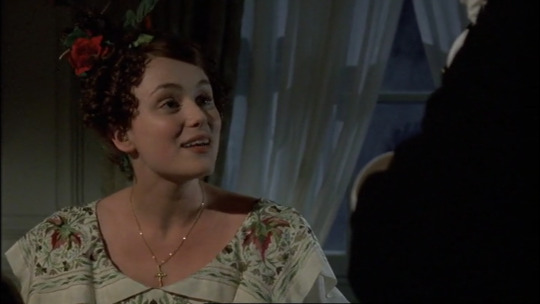
She's the most beautiful woman in the world...
8 notes
·
View notes